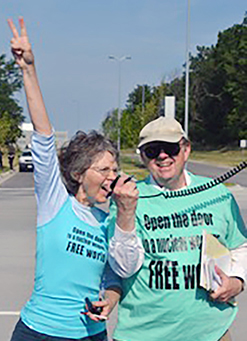Opposing Nuclear Weapons in Kansas City
Posted on November 1, 2018, by Loretto Community
By Jane Peckham Stoever, friend of Loretto and former member, for the Loretto Peace Committee

Photo courtesy of PeaceWorks-KC
Why do my husband and I and a local peace group, tangle with a huge new nuclear weapons parts plant? Well, it’s in our backyard, about 8 miles from our home in the metro Kansas City, Mo., area. Many people who worked at the old plant or on the complex where it stood from 1949 to 2014 have died early deaths from the contaminants at their worksite. We know their stories. We know their families’ tears.
The United States signed the Nuclear Non-Proliferation Treaty, which took effect in 1970, pledging to make a good-faith effort to eliminate nuclear weapons. But the plant that opened in 2014 paves the way to a new generation of nuclear weapons, some smaller than the current ones, therefore more likely to be usable. The U.S. Department of Energy (DOE) houses the nuclear weapons production and waste storage sites. The DOE’s overall budget for 2019 for the National Nuclear Security Administration, which operates the KC plant and other nuclear weapon related sites, is $32 billion.
From 1984 to the early 1990s, Plowshare activists pestered us. They got the name of my husband Henry, a lawyer, from our Catholic Worker priest. Plowshare pacifists poured blood on the concrete silos of Minuteman II nuclear missiles in Missouri, jack-hammered the silo lids and needed Henry’s help during trials and long imprisonments.
In 1998 or so, Loretto member Pat Kenoyer asked Henry to think about joining the PeaceWorks-KC Board. The group, which works toward a world free from war and its weapons (including assault weapons), eventually made Henry its chairman, and I’ve been an active member. We’re a membership organization, with people contributing annually, and our concerns include drone warfare and the war against persons of color in our midtowns. We have ample resources to fund speakers, and our annual fund-raising art fair this past September brought out 106 artists and scads of buyers. In effect, we hold a sacred trust with our members and the larger KC community.
On the nuclear front, three men and I, in 2010, were the first to do civil resistance at the old plant. We blocked a gate and were arrested, with unexpected TV coverage that helped inform Kansas City about the top-secret weapons work. The three men either paid their fines or otherwise declined to go to trial, but I went to court, amazed to find the judge lenient.
By now, many others have done civil resistance, most of them crossing the property line at the new plant. Some 125 times someone has resisted the weapons production, usually with others. A Catholic Worker faith and resistance retreat led to 53 arrests in spring 2011. Most actions are smaller, with the most recent being May 28, Memorial Day, our annual opportunity to recall the deaths from toxins at the old plant and seek to eradicate the weapons altogether. The five “line-crossers” that day included Henry and Tom Fox, who has written against the nuclear insanity for almost four decades as editor or publisher of the National Catholic Reporter. The five come to trial Dec. 7 in the Kansas City, Mo., Municipal Court, with a “Celebration of Hope” the prior night.
In some instances, judges have jailed our resisters for a few days. But several judges have given us reason to hope. In 2013 one gave us writing assignments instead of community service or fines for a sentence. The judge had us answer questions such as this: “If North Korea, China or one of the Middle Eastern countries dropped a nuclear bomb on a U.S. city tomorrow, would that change your opinion about nuclear weapons?” Another judge found Henry not guilty of crossing the property line after he had shown the video of his crossing and agreed he crossed the line. That judge, in follow-up to Henry’s comment that the prosecution had not proven he had stepped across the real property line, determined in 2015 that Henry was not guilty. No proof of the line had been given, and Henry lacked the “mens rea,” the intent to commit a crime. The courtroom of supporters burst into applause.
